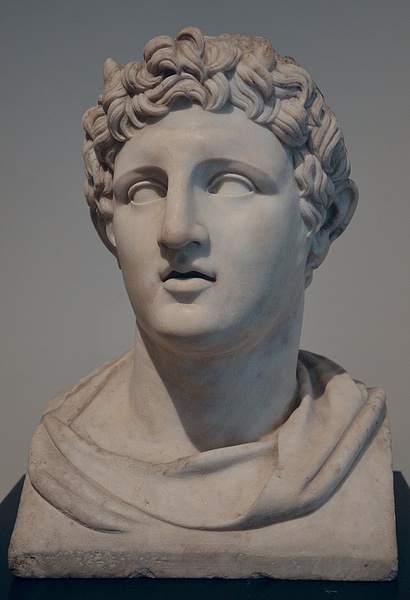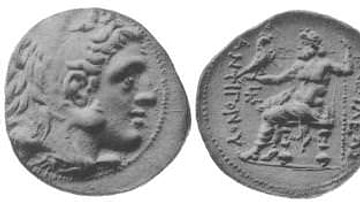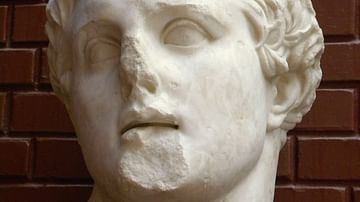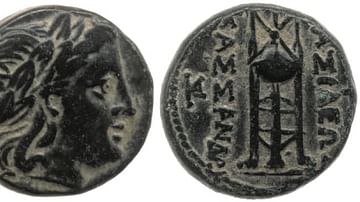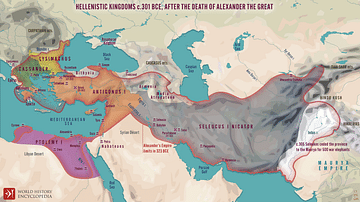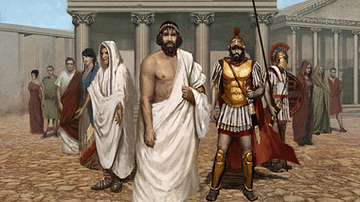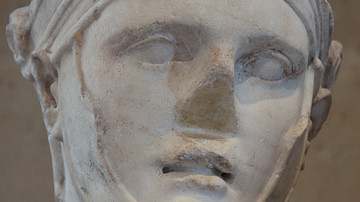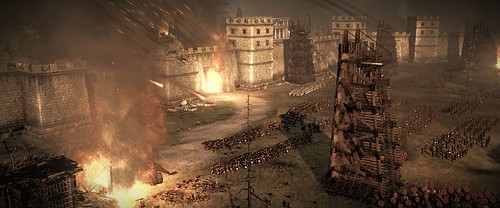
Demetrius I of Macedon, also known as Demetrios Poliorcetes, the 'Besieger' (c. 336 - c. 282 BCE), was a Macedonian king who, along with his father Antigonus I, fought for control of Alexander the Great's empire in the 'Successor Wars'. After successes in central Greece and Cyprus, he gained his lasting reputation as a master planner and 'Besieger of Cities' following his one-year siege of Rhodes. Perhaps with his resources never quite matching his ambition, Demetrius did not live up to his early promise and died without an army or an empire. He is the subject of one of Plutarch's Lives biographies.
Early Life
Demetrius was born in the garrison of Kelainai, Phrygia in 336 BCE as his father was King Antigonus I, at that time one of Alexander the Great's commanders. When Antigonus was exiled in 322 BCE Demetrius accompanied his father and found refuge with the Macedonian general Antipater. He married Phila, daughter of Antipater, who would, later on, become a useful Macedonian connection. Together they had two children Stratonice and Antigonus II Gonatas. On Demetrius' character Plutarch, comparing him with Rome's Mark Antony, said,
Both men were redoubtable womanizers, drinkers and fighters, both were open-handed, extravagant and arrogant, and these resemblances were reflected in the similarity of their fortunes. During their careers they met with prodigious triumphs and disasters, conquered great empires and as easily lost them. (336)
Plutarch continues and compares Demetrius unfavourably with Alexander the Great, suggesting the latter was a true ruler while the former was a mere actor. He, thus, describes, like an actor, Demetrius' taste in dress:
...there was something intensely theatrical about Demetrius. He possessed an elaborate wardrobe of hats and cloaks, broad-brimmed hats with double mitres and robes of purple interwoven with gold, while his feet were clad in shoes of the richest purple felt embroidered with gold. (371)
Demetrius first came to prominence in c. 317 BCE when he commanded his father's cavalry units at the battles of Paraetacene and Gabiene in Persia. However, the first time he took sole command of an army did not go well, he lost in a battle against Ptolemy I and Seleucus I Nikator in Gaza in 312 BCE. Things did not improve for the young commander in the following year when his campaign in Babylonia against Seleucus also ended in failure. Demetrius did make some amends with successes in the region in 311/310 BCE.
Victory at Salamis
Demetrius' fortunes further improved in 307 BCE when he successfully led a campaign in Greece to free Athens from Demetrius of Phaleron. The Antigonids were treated as liberating heroes by the Athenians and given all manner of honours, including their own cults. It is also noticeable that Demetrius allowed the restoration of the Athenian democracy and left no garrison at Athens and nor did he in other liberated cities such as Megara. The rising military star shone even brighter when he famously defeated Ptolemy's fleet at Salamis, off the coast of Cyprus in 306 BCE. Demetrius is credited with being the first to employ artillery mounted on warships to fire on other warships (as opposed to just cities), when he used both stone and arrow-throwing catapults in the battle. Once again Demetrius was magnanimous in victory for he "not only buried the enemy's dead with full honours but he also set his prisoners free (Plutarch, 348)". As a reward for this great victory Antigonus announced that Demetrius would, from now on, be joint king with him.
Siege of Rhodes
In 306/305 BCE campaigns did not go so well in Egypt and then, at Rhodes in 305 - 304 BCE Demetrius gained his title of 'Besieger of Cities' when he blockaded the island for a year. Rhodes, a strategically important island throughout antiquity, was a particularly prosperous trade centre in Hellenistic times and an ally of Ptolemy. Demetrius was an inventive siege-master, his most famous weapon being the helepolis or 'city-taker', a 40-metre high siege tower with nine levels and which was wheeled, armoured, and could carry multiple artillery weapons (ballistae). The tower also had a beam fitted to its front which was decorated with a ram's head and used to punch holes in fortification walls. Siege towers were not new but Demetrius' was the largest so far seen and was so massive it reportedly took 3,400 men to mobilise it.
Ultimately, the campaign was another disappointment and the siege ended in a negotiated truce. After the blockade, the entrepreneurial Rhodians sold Demetrius' siege equipment and used the proceeds to build a massive 32-metre high bronze statue of their patron god Helios - the Colossus of Rhodes and one of the Seven Wonders of the Ancient World. Unfortunately, the statue was toppled by an earthquake in 228 or 226 BCE.
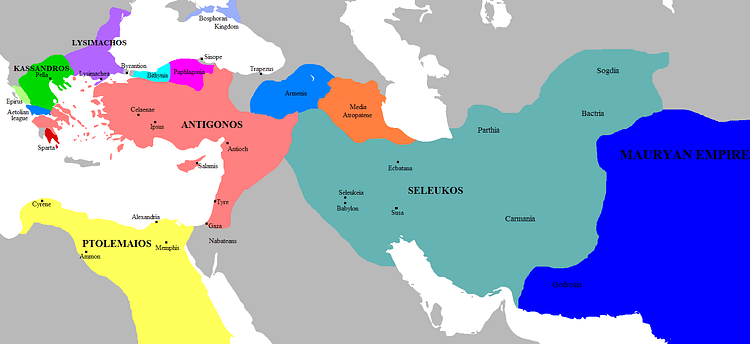
Battle of Ipsus
Demetrius had more success against Cassander back on the Greek mainland in 304 BCE when he and his father extended their influence to include Aetolia and Boeotia. According to Plutarch, Demetrius lived a lavish life of debauchery in Athens, where he pushed for a crash-course initiation into the Eleusian Mysteries and hosted wild parties in the Parthenon. In 303 BCE the city of Sicyon in the Peloponnese surrendered on the mere sight of Demetrius' formidable siege engines, and in 302 BCE the League of Corinth was resurrected which would prove useful one year later. For in 301 BCE the Antigonids were defeated at the Battle of Ipsus in central Phrygia by Lysimachus and Seleucus I. The huge battle was said to have involved 150,000 men and 475 elephants. Demetrius, leading the cavalry and after an initial success, may have charged too deep into the enemy and exposed his father's flank to an attack from Seleucus' elephants. Antigonus was killed and Demetrius retreated to the Isthmus of Corinth.
King of Macedon
Demetrius, still in control of such important cities as Cyprus, Corinth, and Ephesos, was offered a way back into the chaotic political theatre of the Successor Wars when his daughter Stratonice married Seleucus and in return Demetrius was given Cilicia c. 299 BCE. Then in yet another marriage of convenience, he made a treaty with Ptolemy. Demetrius campaigned in Greece again c. 295 BCE when he removed the tyrant Lachares from Athens and defeated Sparta. He then set his sights on the Macedonian throne, which he claimed in 294 BCE with the help of Phila and after murdering Alexander V. Demetrius then established a new Macedonian capital in Magnesia in southern Thessaly, Demetrias.
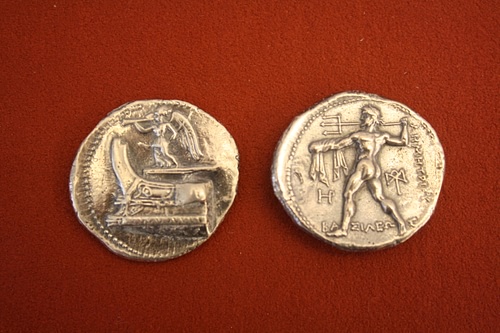
Over-Ambition & Capture
Consolidating his control over central Greece Demetrius went back to his old hobby of besieging cities and twice blockaded Thebes. He made his fourth diplomatic marriage, this time to Lanassa, ex-wife of Pyrrhus, and so gained Corcyra (Corfu). Then, growing ever more ambitious, Demetrius sought to reclaim the Asian territories his father had once controlled. For this purpose, he built a massive fleet of 500 ships. However, in 288 BCE, when his army realised that Lysimachus, Ptolemy, Seleucus and Pyrrhus were all marching on Macedon, they refused to take the field and Demetrius was forced to flee south. Ptolemy offered a peace deal in 287 BCE, and Demetrius set his sights on Asia Minor and Seleucus. However, with his army devastated by plague and famine, he was forced to surrender once again in 285 BCE.
Demetrius, once heir to a great empire and King of Macedon for seven years, died a prisoner of Seleucus, albeit, one kept in a gilded cage. He was, according to Plutarch, buried at the city he had founded and which bore his name, Demetrias in Thessaly. The 'Besieger', then, was a victim of his times, an age when rulers without lands or rulers with lands but no particular ancestral ties to them, squabbled for the pieces of Alexander's broken empire. Demetrius himself was conscious of the ever-changing fortunes in his roller-coaster career for he would often quote in frustration these words on Fortune by the Greek tragedian Aeschylus - 'You fan my flame one moment: In the next, extinguish it.' (Plutarch, 365)
